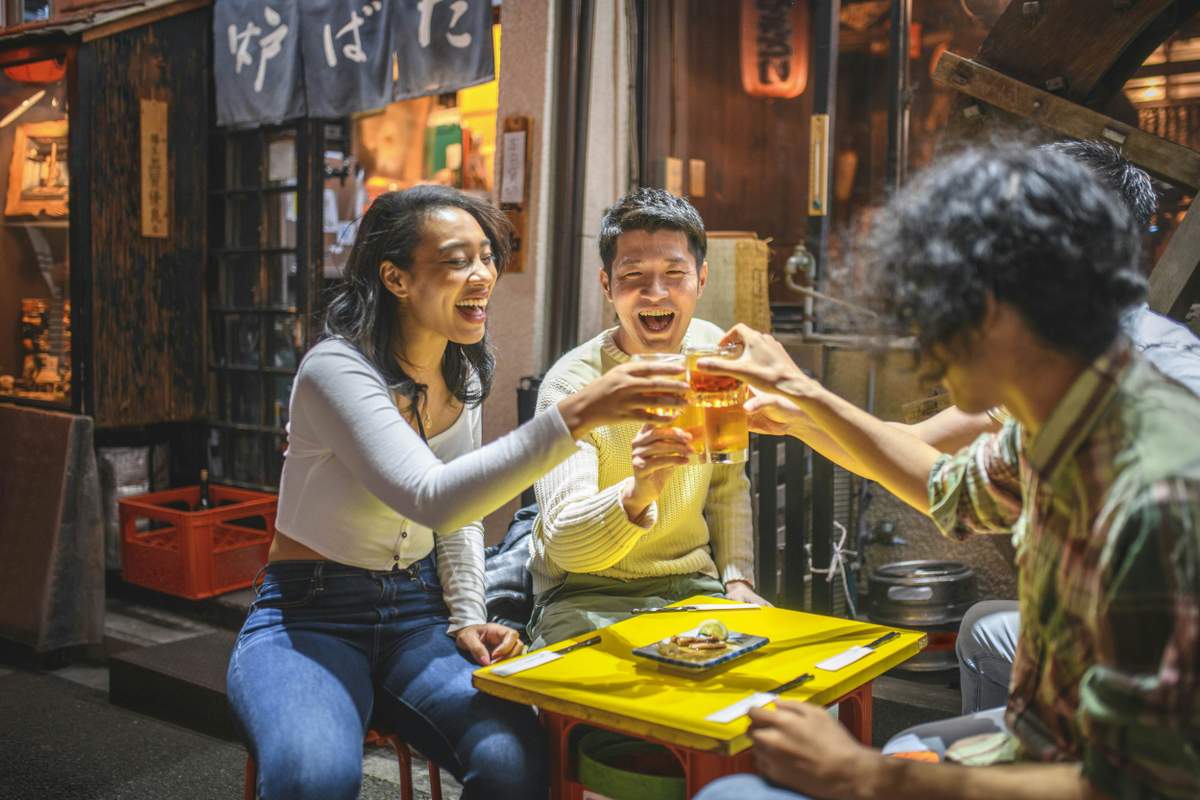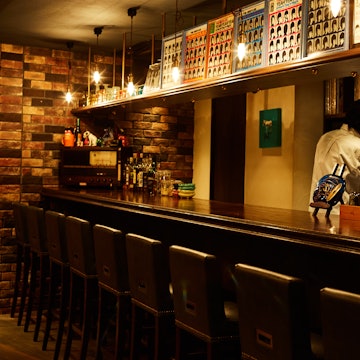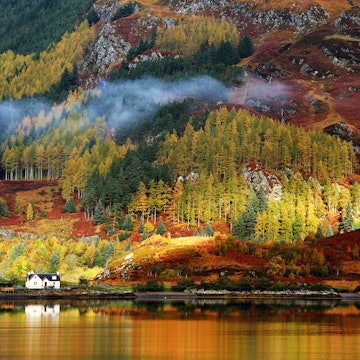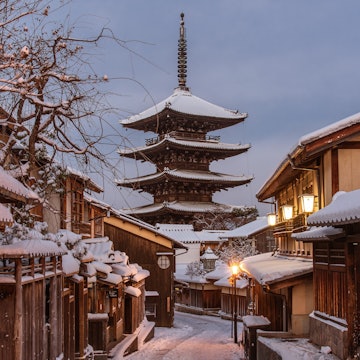

One of Nara's famous deer grazes near Tōdai-ji temple. Sean Pavone/Shutterstock
Japan's first permanent capital is today a place to explore as freely as its famous deer, a far cry from congested Kyoto and Osaka that bookend Nara. Essentially, Nara is one expansive park with omnipresent wandering deer that give it fairytale-like magic. That dreamy charm lingers as you uncover a sky-high Buddha effigy, designer Japanese gardens that transform their style at every turn, and festivals that unleash fire upon a mountain or shower sparks onto the spectators.
You can find fascinating traces of ancient Nara and its Shinto and Buddhist treasures. Then chow down on its speciality eats and sample its sake. All the while, the majestic deer accompany you amongst Nara's eight UNESCO World Heritage Sites. Here are 11 of the most magical reasons to visit Nara.
1. Hand-feed the deer in Nara Park
Deer are the head-turning stars of Nara. Nara Park is home to around 1,300 wild deer, making it one of the best places in Japan to see and interact with them. Nara Park is the name of the whole vast area that takes in the temples and Japanese gardens listed here.
One of the great joys of visiting is slowing down and finding your own deer to feed or get to know up close. The deer are generally gentle, but it doesn't hurt to keep in mind that they are semi-wild animals and this is not a zoo, so expect to be both pestered and rejected by different deer, depending on their personalities. The deer are considered sacred and are a national treasure of Japan. They roam freely and the best way to befriend them is by offering them special deer crackers, known as shika senbei, which you can buy from vendors all across the area. The sugar-free, wheat and rice bran crackers are produced by the Foundation for the Protection of Deer in Nara. The deer love them, and some have learned to bow their heads to ask for the crackers or in response to visitors bowing to them. In fact, the deer are often so spoiled for choice that there are extra crackers lying around.
Detour: Noborioji Park definitely has a high concentration of deer, but you'll find the gentle beasts roaming everywhere. Try around Kasuga Taisha Shrine for real quiet time with the deer.
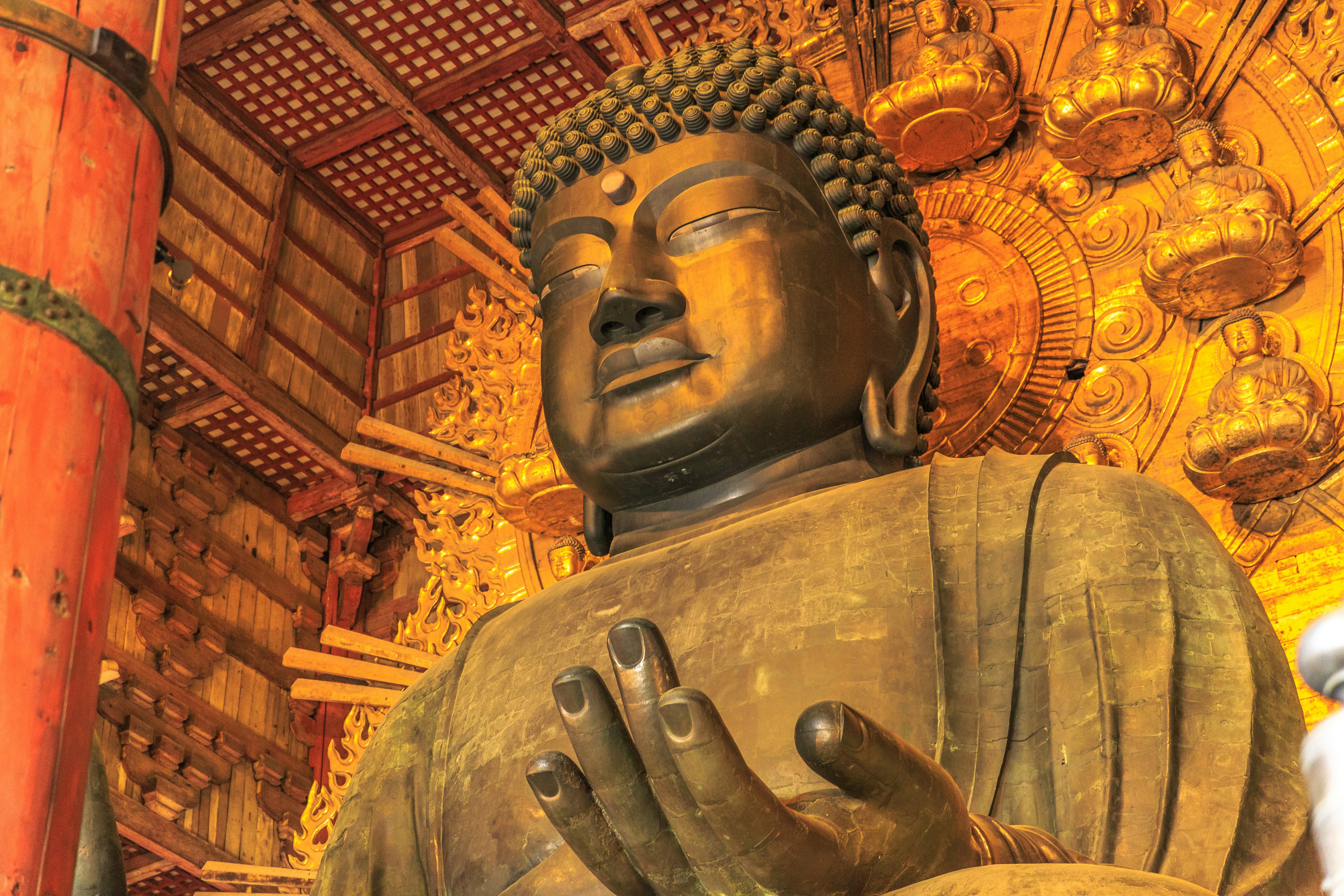
2. Peer way up at the giant Buddha of Tōdai-ji Temple
Nothing prepares you for the hulking mass of the Daibutsu-den (Great Buddha Hall) of Tōdai-ji Temple. At 57 meters (187 feet) wide and 49 meters (160 feet) high, it's one of the largest wooden buildings in the world. Inside, the size makes sense once you crane your neck up at the equally colossal Daibutsu (Great Buddha), a representation of Vairocana Buddha – Buddha of light. It's easy to feel a sense of reverence as you take in the nearly 15-meter-tall statue (49 feet), arguably the largest bronze representation of Buddha in the world.
Completed in 752 CE, the intricate details of the Buddha's serene expression and the grandeur of its raised hand add to the majesty of the moment. To get an idea of its heft, you can try to wriggle through the Buddha’s nostril, as there is a matching-sized hole in a pillar in the main hall.
Detour: Most people walk from Noborioji Park to Tōdai-ji Temple. For peace after the crowds of the Great Buddha, exit and turn northeast towards the cobbled hillside path of Tōdai-ji Urasando for ornate-eaved buildings and views across Nara.
3. Bathe in the fiery ember light of the Otaimatsu ritual
Picture it: flaming torch heads burning like slow-motion meteorites, smoldering bright in the night, lighting up the faces in the crowd. Each year, at the end of peace and harvest prayers, monks perform the Otaimatsu ritual at Nigatsudo Hall, near the Great Buddha Hall of Tōdai-ji Temple. Fiery 8m-long torches are dragged across the temple balconies, whipping up plumes of smoke. A shower of sparks falls towards the onlookers below. The embers are believed to protect the receivers from evil spirits. Don't worry, it's also easy to watch from a safe distance. The hypnotic Buddhist ritual has been performed for more than 1,250 years.
Planning tip: This red-hot showstopper event is held just after nightfall at Nigatsudo Hall at Tōdai-ji Temple every night from March 1 to 14 as part of the Omizutori festival.
4. Lay hands on the world's oldest wooden buildings at Hōryū-ji Temple
The scent of wood, pine trees and incense perfumes the air of the Hōryū-ji Temple grounds. As you enter the Chūmon, or central gate, you'll be stared down by Japan's oldest statues of Kongo Rikishi, the musclebound guardians commonly found protecting the entrances of large temples. Inside, the unfolding collection of a five-story pagoda and grand halls have the wow factor of being the oldest surviving wooden structures in the world, dating back to the 7th century. A standout is the exquisite eight-sided Yumedono (Hall of Visions), which contains a life-sized statue of Prince Shōtoku, who founded Hōryū-ji and helped popularize Buddhism in Japan. The temple houses some of Japan's oldest Buddha statues. The most prized artifact is the Kudara Kannon (Goddess of Mercy) statue carved from a single piece of camphor wood, standing just over 2 meters (6 feet) tall and dating back to the Asuka period (538-710 CE). Its slender and graceful form stands out compared to other Buddhist statues of the same era. The unique facial expression of this carving even has a name: "archaic smile" for the slightly lifted corner of the mouth.
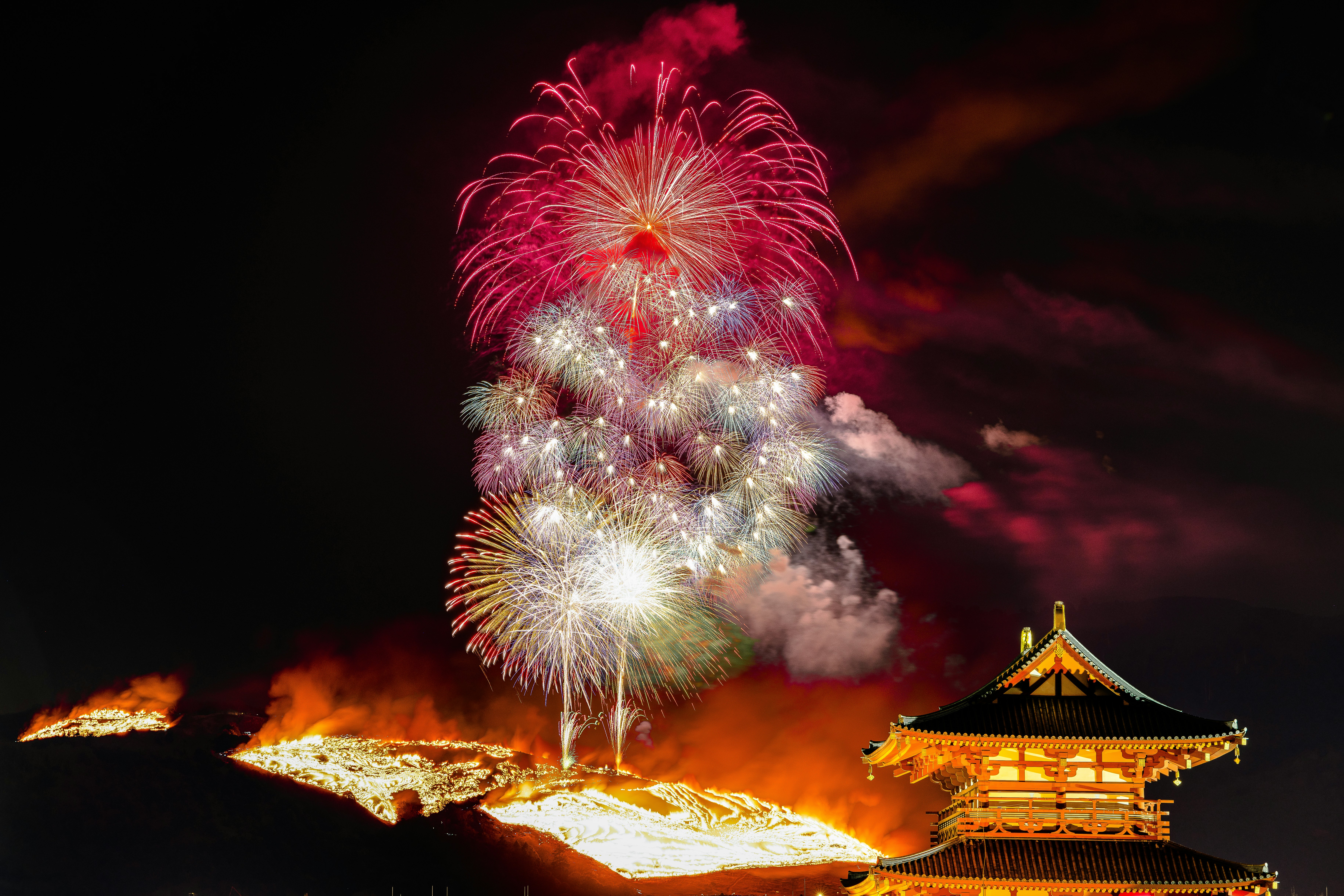
5. Witness a mountain set on fire during Wakakusa Yamayaki
Nara seems to have an affinity for fire. The Wakakusa Yamayaki festival begins with a fireworks display to warm up the winter sky and drive away wandering deer to safety.
Then, a bamboo cage of fire is stoked up, ready for monks and firefighters to torch the young grass at the base of Mt Wakakusa. A ribbon of flames unfurls across the mountainside until the entire area is engulfed in a mesmerizing sea of fire. You can witness the burning mountain from all over Nara, creating a spectacular show that symbolizes the coming of early spring. At other times of the year, take a short and steep hike up Mt Wakakusa to the 342-meter (1,122 feet) summit, stopping at picnic points.
Planning tip: The fiery centuries-old tradition is held annually on the fourth Saturday of January.
6. Clip clop through the former merchant district of Naramachi
The sound of footsteps on the cobblestone paths through the former merchant district of Naramachi (Nara Town) adds to the sense of stepping back in time to old Nara. You'll encounter beautifully preserved machiya (traditional wooden townhouses) that once housed merchants and craftspeople. Sure, you'll also find machiya in crowd-heavy Kyoto, but in Naramachi you get quiet time to enter historic houses. Take things slowly in Naramachi, lingering in handicraft and toy museums to get a real flavor of Nara's heritage.
Detour: If you want to get hands on with the handicrafts, walk 10 minutes away to Nara Visitor Center & Inn where free, informal classes can guide you through making origami deer or a calligraphy lesson to write your name in Japanese kanji characters.
7. Drink in every tea house view in Isui-en Garden
Even through stillness, Isui-en Gardens tells a dynamic story of traditional Japanese aesthetics in two parts – one designed in the style of an Edo-period (1603–1868) strolling garden and another added in the early 20th century. The paths wind through a landscape of pines, rocks, and moss that open onto vistas of curving hills and clouds mirrored in the ponds. Isui-en is an outstanding example of Japanese shakkei (borrowed scenery) where background landscapes like Mt Wakakusayama are incorporated into the garden's design. Moving through the gardens, you'll find charming tea houses for a matcha green-tea break. Each tea house offers a unique perspective of the garden, taking in water and sky. "Isui-en" means "garden founded on water," reflecting its ponds fed by the nearby Yoshikigawa River.
Planning tip: The two green spaces Isui-en Garden and Yoshiki-en Garden are adjacent and can be visited easily on foot after the Giant Buddha of Tōdai-ji Temple, a 10-minute walk away from the gardens.

8. Triple dip the three Japanese gardens of Yoshiki-en Garden
Adjacent to Isui-en Garden, Yoshiki-en Garden may have the same borrowed scenery but manages to cram three gorgeous garden styles in a more compact layout built around a pond. In under an hour you can enjoy a natural showcase of a traditional Japanese pond garden, a moss garden, and a tea-ceremony garden. Dotted throughout are cute arched bridges, stone lanterns, and former monks' thatched-roof homes beneath towering trees to make you feel lost in time.
Planning tip: Visit during the fall for a breathtaking sunburst of leaves everywhere you look. Fall is also a quieter time, with more peace to ponder the shades of red, orange, and yellow. Show your non-Japanese passport in any season for free admission to the garden.

9. Gobble up Nara sushi and persimmon treats
Nara has some familiar Japanese dishes with a twist. The top meal to try is bite-sized kakinoha-zushi, oblongs of rice topped with marinated mackerel, salmon, or sea bream, all wrapped in fragrant persimmon leaves. The leaves not only add a subtle, unique flavor but also boast natural antibacterial properties. Persimmons have been cultivated in Nara for millennia, and today the prefecture is Japan's persimmon production hotspot. Taste test persimmon treats in multiple forms from dried and chewy persimmons to jams and monaka, a traditional crisp wafer shell filled with a sweet persimmon paste.
Then try sake in Nara, where the fundamentals of modern sake (rice wine) brewing techniques were first developed in Japan at Shoryakuji Temple. There are dozens of sake breweries in Nara prefecture, with an outlet along Naramachi where you can ponder the flavors.

10. Drift along the forested shinto paths of Kasuga Taisha
Shinto shrine meets ancient woodland at the fantastical Kasuga Taisha. Founded in the 8th century, this sprawling shrine was created to protect the new capital, Nara. It was ritually rebuilt every 20 years, according to Shintō tradition, until the late 19th century and still looks immaculate. Wander the peaceful trails, thick with towering cedar trees and greenery, to see the brilliantly contrasting vermilion buildings.
Planning tip: Every morning at 9am, except for festival days, visitors are welcome to observe the chōhai (morning prayer service), held in the Naoraiden (Ceremony Hall).
During the Mantōrō lantern festival in early February and mid-August, the shrine corridors and paths are illuminated with nearly 3,000 lanterns.

11. Behold the Buddhist treasures of Nara National Museum
The whole of Nara is historic, but Nara National Museum is practically heaving with Buddhist treasures. The museum's collection of Buddhist sculptures, paintings, altar articles, and ritual objects gives you a deep dive into Japanese religious art as a fusion of devotion and artistry. Take a peek at its eye-catching multi-armed deities like the Thousand-Armed Kannon (Senju Kannon). These intricate statues, crafted with incredible detail, along with thousands of other pieces, provide a timeline of the spiritual and artistic evolution of Japan.






